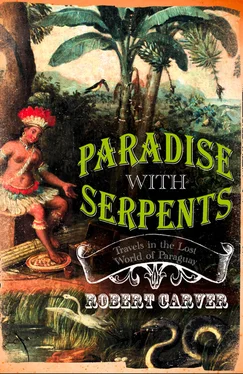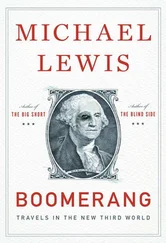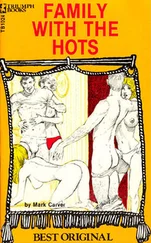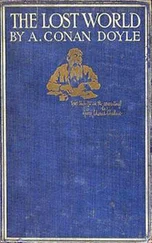The transit passengers, mostly Brazilians waiting for internal flights, whether upright, prone or at all angles between, were uniformly young, elegant and beautifully dressed. Wasp-waisted black men, ranging from double espresso to palest café au lait , drifted past me dressed in impossibly stylish suits of pastel hues. They were shod in elegant patent shoes which looked like Milan goes Carnival in Rio. There was a calm, almost Zen atmosphere to this hyper-modern airport, hi-tech tranquillity, luxe, calme and volupté . By definition, only the richest could afford to fly in this huge but deeply divided society. The chaos, the colour, the poverty of the favelas was nowhere in evidence. Problems? What problems? you might ask yourself. But the newspapers reminded you every time you glanced at their headlines. Argentina, Brazil, much of South America was in deep crisis. Argentina had withdrawn from its commitment to value the peso on par with the dollar. Foreign currency reserves had vanished in unexplained circumstances. The banks had shut their doors. Now outside the angry protesters, already known as los ahorristas , hammered at the roller-shutter doors with sticks and batons, while the police looked on sympathetically – they too had lost their savings: this was a middle-class and middle-aged protest. They wanted their money back. They had trusted their government but their government had, in effect, stolen their money, promising to honour an exchange rate, then reneging, then closing the banks by fiat, refusing to allow savers access to their own money. Who would ever trust their money to an Argentine bank again? How could you run any sort of economy when the banks were untrustworthy and closed the doors on their own customers? Argentina could not, would not service its international debts. It had borrowed and borrowed and borrowed, but the money had all been stolen or wasted. No new loans could be negotiated until the country agreed to start repaying the interest on its old loans. There were already food shortages, medical supplies running out, layoffs and bankruptcies. Kidnapping and gunlaw had proliferated. The demonstrations in the streets against the government were turning ugly. One of the richest – in theory at least – countries in the world was behaving like one of the poorest. In Brazil the situation teetered on the edge of crisis. And what of Paraguay? It was hard to find anything out about that secretive and isolated country. I would simply have to go and find out for myself.
Initially, I had favoured the classic approach into the country – via Argentina – to Buenos Aires, and up the River Plate and River Paraguay to Asunción. It was the route everyone had always taken from the first Spanish conquistadors to the exiled Argentine President Perón. But the old Mihailovich steamers had passed out of service, and Paraguay itself had started to look away from Argentina, from the south and its past, instead looking east to Brazil, and north to Miami and the USA. So I decided to fly to Asunción via Sao Paulo. There was another reason, apart from chaos, that I did not want to go via Argentina. It is no secret that the relations between Paraguay and Argentina have always been poor. Every Argentine I had met in London – and I had met dozens of them – had expressed a low opinion of Paraguay and Paraguayans. I was not going to get any helpful information from such entrenched and biased enemies of the country I wanted to explore. They seemed to regard the Paraguayans as backward natives, Indians in tents, almost savages. Their contempt was palpable.
From time to time, from the tannoy, a soft, sibilant voice would whisper departures in Brazilian-accented Portuguese to destinations from a poet’s lexicon – Manaos and Rio de Janeiro, Bahia de San Salvador and Cartagena de las Indias, Valparaiso and Tegucigalpa. However, there was just one flight to Paraguay and I would have to wait six hours for it. I found the departure gate and read the notice posted in front of it in Spanish, Portuguese and English: ‘Passengers are advised that all revolvers, automatics, rifles and other firearms must be unloaded with ammunition and packed inside luggage that has been checked in. No person carrying loaded or unloaded weapons will be allowed on to the plane. Thank you for your co-operation.’
With a sinking heart I realized that this was an official indication of what I had been warned of before – that Paraguayans have a love affair with powder and shot, pistol and lead, that knows no bounds. ‘Do they all carry pistols?’ I had asked a seasoned old Paraguay hand in London. ‘Well, I wouldn’t say all – no, not by a long chalk. However, it is fairly common. I mean, there are shootings all the time – I mean every day, everywhere. And knife fights, of course. It’s as well to be very polite to people. That generally pays off. Unless they want to kill you, in which case no amount of politeness would help.’ This was useful advice, I suppose: I had made a mental note to be more than usually polite. In the event, there might have been some Paraguayans I met during my eventful trip who were not armed with some sort of pistol, sub-machine gun, machete or knife, but I couldn’t actually swear to it. Often we find ourselves the embarrassed witness of other people’s intimate little moments when they think they are not being observed – the surreptitious scratch of the groin, the furtive pick of the nose, the fart eased out apparently unnoticed. In Paraguay these moments always revolved around someone’s jacket falling open to reveal a gleaming or matt-black automatic peeping out coyly from waistband or shoulder holster; a drawer opened by mistake to display a cluster of Uzi sub-machine guns, a brace of pump-action sawn-off shotguns, or a vintage Luger with an embossed swastika on the wooden handle. As tea is to China, chocolate to Switzerland or red wine to France, so are firearms to Paraguay.
The first group of Paraguayans I saw, clearly waiting for the same flight as myself, were obviously vaqueros or gauchos – cowboys in jeans and stetson hats, sprawled on the bench seats near the departure gate. Each of them had a tan cowhide grip out of which protruded the butts of their rifles. They all wore empty leather pistol holsters and belts with empty bullet holders. They had obviously read the same notice I had and would check their luggage in when the counter opened. I was tempted to go and talk to them, but didn’t. They looked tired, many of them actually kept falling asleep. They had clearly driven a herd of cattle across the border from Paraguay to Brazil, and were now returning home the quickest way possible. They would have sold their horses along with the cattle – it would make no sense to ride them back. Besides a certain natural diffidence in pushing myself forward into such an uncompromising bunch, there was a question of language. If the word ‘Indian’ did not convey political incorrectness, one would have said these were Indians. They had coppery skins and hooked noses, dark lank hair and tight, compact bodies. They were cholos, campesinos or indigenos , though, that was what one called them. Indio was considered by many a term of abuse and never used politely, though the first morning I walked through the central square in Asunción a very drunk man approached me from the favela below the Presidential Palace, cackling and swaying – ‘ Yo soy indio, señor ,’ he shouted at me. It was 7.30am and he was well away.
There was also the question of what language one should use in speaking to people. Graham Greene, who had visited Paraguay in the depths of the Stroessner dictatorship, had been warned that if he spoke in Spanish in the countryside, he might be assumed to be being patronizing and so run the risk of being shot. On the other hand, if he spoke Guarani, the language of the predominant ethnic group, he might be assumed to be insulting, considering them to be low, ignorant fellows. There was a third lingo, too, called Jalape, which was a mixture of Spanish and Guarani, just to make things clear as mud. I asked my Paraguay expert in London about this. ‘Well, you could always try speaking to them in English – that wouldn’t cause any offence. Not that they’d understand you, of course. In the Chaco the locals speak a version of 17th-century plattdeutsch. They learnt it from the Mennonites who farm out there. So you can find this chappie who knows where the alcalde’s office is but the only language he can give you instructions in is his own tribal palaver and 17th-century Low German. I suppose you speak that fluently, of course?’ I mumbled something about French and Italian. ‘Well, those won’t be much use. The other Germans, the Third Reich lot, don’t actually say “Heil Hitler” any more, but rather “Grüss Gott” . You could manage that, I suppose?’ Surely now that Stroessner, the half-Guarani, half-Bavarian dictator who had had a signed photograph of Hitler in his office and wore a pair of Goering’s boots, had been expelled from the country, things were rather better? ‘Rather worse, if anything. He ran a tight ship, did Don Alfredo. If you were a communist he had your balls cut off with a chainsaw to the sound of Guarani harp music. But if you were white, reasonably prosperous looking and apolitical he gave you no grief. Asunción in those days was a frightened town but a safe one. Now it’s frightened and very unsafe. No one is really in charge, no one has been paid for months, in some cases for years. Tempers are short, so is cash, and with the poor even food. In the last year things have gone downhill badly. There’s talk of a coup in the offing – or a revolution. Keep your head down is my advice.’ Advice I fervently hoped I was going to be able to keep.
Читать дальше











